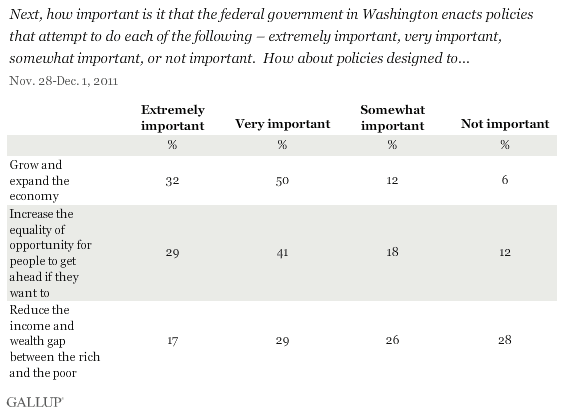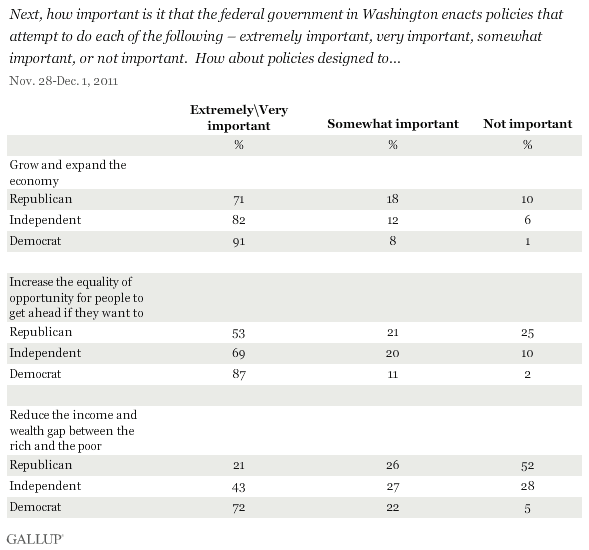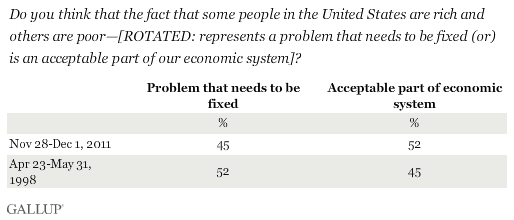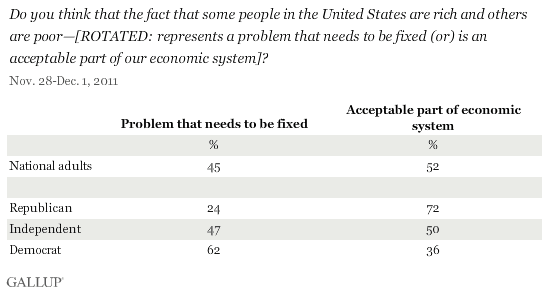PRINCETON, NJ -- More Americans say it is important that the federal government enact policies that grow the economy and increase equality of opportunity than say the same about reducing the income and wealth gap between the rich and the poor.

These data, from a Nov. 28-Dec.1 Gallup survey, show that while 46% of Americans believe it is extremely or very important that the federal government in Washington reduce the income and wealth gap between the rich and poor, 70% say it is important for the government to increase equality of opportunity, and 82% say it is important for the government to grow and expand the economy.
The issue of reducing the income and wealth gap has become politically salient in recent months. The Occupy Wall Street protests in a number of cities around the country have drawn attention to allegations of special privileges and power among the wealthiest Americans.
President Barack Obama has also adopted a more populist emphasis in recent months, decrying the deteriorating position of the middle class, noting that in recent years, "Those at the very top grew wealthier from their incomes and their investments -- wealthier than ever before. But everybody else struggled with costs that were growing and paychecks that weren't -- and too many families found themselves racking up more and more debt just to keep up." Obama and other Democrats have pushed for increased taxes on those in higher income brackets as one way to address their concerns.
There are, not surprisingly, substantial differences in the ways in which Democrats, independents, and Republicans look at these issues.
Americans of all political persuasions believe that it is important to grow and expand the economy, with Republicans placing slightly less emphasis on it than independents and Democrats do.
Republicans are, however, much less likely than independents and Democrats to say it is important for the government to be involved in increasing equality of opportunity or reducing the income/wealth gap.
While 72% of Democrats say it is extremely or very important to reduce the income and wealth gap between rich and poor, 43% of independents and 21% of Republicans agree.
A majority of all three partisan groups say that increasing equality of opportunity is important, but Democrats (87%) are again much more likely to say it's important than independents (69%) or Republicans (53%).

Slight Majority of Americans Say Inequalities Are Acceptable
A separate Gallup question finds a slight majority of Americans (52%) now say that "the fact that some people in the United States are rich and others are poor" is an acceptable part of our economic system. This is a change from the last time Gallup asked the question in 1998, when a slight majority of Americans said that such inequalities were a problem that needs to be fixed.

Partisan differences in response to this question follow predictable lines. Sixty-two percent of Democrats say that the gap between rich and poor is a problem that needs to be fixed, while about a quarter of Republicans (24%) agree.

Implications
The responses to these two questions help put the recent political activity focusing on inequality and differences between rich and poor into some context. It is clear that while some Americans, disproportionately Democrats, consider it important that the federal government enact policies to reduce the income and wealth gap, many more Americans consider it important that the government grow the economy and increase the equality of opportunity. It is also clear that Americans are actually slightly less likely now than 13 years ago to say that the fact that the country has rich people and poor people represents a problem that needs to be fixed. A slight majority now say that such inequalities are an acceptable part of the economic system.
There is little doubt that these issues will remain a significant focal point of the 2012 presidential campaign, and may be a major fault line between the positions of President Obama and the eventual Republican nominee.
Survey Methods
Results for this Gallup poll are based on telephone interviews conducted Nov. 28- Dec. 1 2011, with a random sample of 1,012 adults, aged 18 and older, living in all 50 U.S. states and the District of Columbia.
For results based on the total sample of national adults, one can say with 95% confidence that the maximum margin of sampling error is ±4 percentage points.
Interviews are conducted with respondents on landline telephones and cellular phones, with interviews conducted in Spanish for respondents who are primarily Spanish-speaking. Each sample includes a minimum quota of 400 cell phone respondents and 600 landline respondents per 1,000 national adults, with additional minimum quotas among landline respondents for gender within region. Landline telephone numbers are chosen at random among listed telephone numbers. Cell phones numbers are selected using random digit dial methods. Landline respondents are chosen at random within each household on the basis of which member had the most recent birthday.
Samples are weighted by gender, age, race, Hispanic ethnicity, education, region, adults in the household, and phone status (cell phone-only/landline only/both, cell phone mostly, and having an unlisted landline number). Demographic weighting targets are based on the March 2010 Current Population Survey figures for the aged 18 and older non-institutionalized population living in U.S. telephone households. All reported margins of sampling error include the computed design effects for weighting and sample design.
In addition to sampling error, question wording and practical difficulties in conducting surveys can introduce error or bias into the findings of public opinion polls.
View methodology, full question results, and trend data.
For more details on Gallup's polling methodology, visit https://www.gallup.com/.
